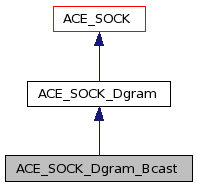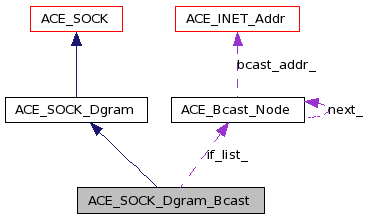Defines the member functions for the ACE_SOCK datagram abstraction. More...
#include <SOCK_Dgram_Bcast.h>


Public Member Functions | |
| ACE_SOCK_Dgram_Bcast (void) | |
| Default constructor. | |
| ACE_SOCK_Dgram_Bcast (const ACE_Addr &local, int protocol_family=PF_INET, int protocol=0, int reuse_addr=0, const ACE_TCHAR *host_name=0) | |
| ~ACE_SOCK_Dgram_Bcast (void) | |
| Default dtor. | |
| int | open (const ACE_Addr &local, int protocol_family=PF_INET, int protocol=0, int reuse_addr=0, const ACE_TCHAR *host_name=0) |
| Initiate a connectionless datagram broadcast endpoint. | |
| int | close (void) |
| Close up and release dynamically allocated resources. | |
| ssize_t | send (const void *buf, size_t n, u_short portnum, int flags=0) const |
| ssize_t | send (const iovec iov[], int n, u_short portnum, int flags=0) const |
| ssize_t | send (const void *buf, size_t n, const ACE_Addr &addr, int flags=0) const |
| ssize_t | send (const iovec iov[], int n, const ACE_Addr &addr, int flags=0) const |
| void | dump (void) const |
| Dump the state of an object. | |
Public Attributes | |
| ACE_ALLOC_HOOK_DECLARE | |
| Declare the dynamic allocation hooks. | |
Private Member Functions | |
| int | mk_broadcast (const ACE_TCHAR *host_name) |
| Make broadcast available for Datagram socket. | |
| int | get_remote_addr (ACE_Addr &) const |
| Do not allow this function to percolate up to this interface... | |
Private Attributes | |
| ACE_Bcast_Node * | if_list_ |
| Points to the head of the list of broadcast interfaces. | |
Defines the member functions for the ACE_SOCK datagram abstraction.
Definition at line 57 of file SOCK_Dgram_Bcast.h.
| ACE_SOCK_Dgram_Bcast::ACE_SOCK_Dgram_Bcast | ( | void | ) |
Default constructor.
Definition at line 63 of file SOCK_Dgram_Bcast.cpp.
| ACE_SOCK_Dgram_Bcast::ACE_SOCK_Dgram_Bcast | ( | const ACE_Addr & | local, | |
| int | protocol_family = PF_INET, |
|||
| int | protocol = 0, |
|||
| int | reuse_addr = 0, |
|||
| const ACE_TCHAR * | host_name = 0 | |||
| ) |
Definition at line 72 of file SOCK_Dgram_Bcast.cpp.
: ACE_SOCK_Dgram (local, protocol_family, protocol, reuse_addr), if_list_ (0) { ACE_TRACE ("ACE_SOCK_Dgram_Bcast::ACE_SOCK_Dgram_Bcast"); if (this->mk_broadcast (host_name) == -1) ACE_ERROR ((LM_ERROR, ACE_TEXT ("%p\n"), ACE_TEXT ("ACE_SOCK_Dgram_Bcast"))); }
| ACE_SOCK_Dgram_Bcast::~ACE_SOCK_Dgram_Bcast | ( | void | ) |
Default dtor.
Definition at line 15 of file SOCK_Dgram_Bcast.inl.
{
ACE_TRACE ("ACE_SOCK_Dgram_Bcast::~ACE_SOCK_Dgram_Bcast");
}
| int ACE_SOCK_Dgram_Bcast::close | ( | void | ) |
Close up and release dynamically allocated resources.
Reimplemented from ACE_SOCK.
Definition at line 41 of file SOCK_Dgram_Bcast.cpp.
{
ACE_TRACE ("ACE_SOCK_Dgram_Bcast::close");
ACE_Bcast_Node *temp = this->if_list_;
this->if_list_ = 0;
// Release the dynamically allocated memory.
while (temp != 0)
{
ACE_Bcast_Node *hold = temp->next_;
delete temp;
temp = hold;
}
// Shut down the descriptor.
return ACE_SOCK::close ();
}
| void ACE_SOCK_Dgram_Bcast::dump | ( | void | ) | const |
Dump the state of an object.
Reimplemented from ACE_SOCK_Dgram.
Definition at line 31 of file SOCK_Dgram_Bcast.cpp.
{
#if defined (ACE_HAS_DUMP)
ACE_TRACE ("ACE_SOCK_Dgram_Bcast::dump");
#endif /* ACE_HAS_DUMP */
}
| int ACE_SOCK_Dgram_Bcast::get_remote_addr | ( | ACE_Addr & | ) | const [private] |
Do not allow this function to percolate up to this interface...
Reimplemented from ACE_SOCK_Dgram.
| int ACE_SOCK_Dgram_Bcast::mk_broadcast | ( | const ACE_TCHAR * | host_name | ) | [private] |
Make broadcast available for Datagram socket.
Definition at line 109 of file SOCK_Dgram_Bcast.cpp.
{
ACE_TRACE ("ACE_SOCK_Dgram_Bcast::mk_broadcast");
int one = 1;
if (ACE_OS::setsockopt (this->get_handle (),
SOL_SOCKET,
SO_BROADCAST,
(char *) &one,
sizeof one) == -1)
ACE_ERROR_RETURN ((LM_ERROR, ACE_TEXT("%p\n"),
ACE_TEXT("ACE_SOCK_Dgram_Bcast::mk_broadcast: setsockopt failed")),
-1);
#if !defined (ACE_WIN32) && !defined(__INTERIX)
ACE_HANDLE s = this->get_handle ();
char buf[BUFSIZ];
struct ifconf ifc;
ifc.ifc_len = sizeof buf;
ifc.ifc_buf = buf;
// Get interface structure and initialize the addresses using UNIX
// techniques.
if (ACE_OS::ioctl (s,
SIOCGIFCONF,
(char *) &ifc) == -1)
ACE_ERROR_RETURN ((LM_ERROR, ACE_TEXT("%p\n"),
ACE_TEXT("ACE_SOCK_Dgram_Bcast::mk_broadcast: ioctl (get interface configuration)")),
ACE_INVALID_HANDLE);
struct ifreq *ifr = ifc.ifc_req;
struct sockaddr_in host_addr;
// Get host ip address
if (host_name)
{
hostent *hp = ACE_OS::gethostbyname (ACE_TEXT_ALWAYS_CHAR (host_name));
if (hp == 0)
return -1;
else
#if defined(_UNICOS)
{
ACE_UINT64 haddr; // a place to put the address
char * haddrp = (char *) &haddr; // convert to char pointer
ACE_OS::memcpy(haddrp,(char *) hp->h_addr,hp->h_length);
host_addr.sin_addr.s_addr = haddr;
}
#else /* ! _UNICOS */
ACE_OS::memcpy ((char *) &host_addr.sin_addr.s_addr,
(char *) hp->h_addr,
hp->h_length);
#endif /* ! _UNICOS */
}
#if !defined(AIX) && !defined (__QNX__) && !defined (__FreeBSD__) && !defined(__NetBSD__) && !defined (ACE_VXWORKS) && !defined(__APPLE__)
for (int n = ifc.ifc_len / sizeof (struct ifreq) ; n > 0;
n--, ifr++)
#else
/*
There are addresses longer than sizeof (struct sockaddr) eg. IPv6
or QNX::links. In this case address does not fit into struct ifreq.
The code below could be applied everywhere, but not every system
provides sockaddr.sa_len field.
*/
for (int nbytes = ifc.ifc_len; nbytes >= (int) sizeof (struct ifreq) &&
((ifr->ifr_addr.sa_len > sizeof (struct sockaddr)) ?
(nbytes >= (int) sizeof (ifr->ifr_name) + ifr->ifr_addr.sa_len) : 1);
((ifr->ifr_addr.sa_len > sizeof (struct sockaddr)) ?
(nbytes -= sizeof (ifr->ifr_name) + ifr->ifr_addr.sa_len,
ifr = (struct ifreq *)
((caddr_t) &ifr->ifr_addr + ifr->ifr_addr.sa_len)) :
(nbytes -= sizeof (struct ifreq), ifr++)))
#endif /* !defined(AIX) && !defined (__QNX__) && !defined (__FreeBSD__) && !defined(__NetBSD__) && !defined (ACE_VXWORKS) && !defined(__APPLE__) */
{
#if defined (__QNX__) || defined (ACE_VXWORKS)
// Silently skip link interfaces
if (ifr->ifr_addr.sa_family == AF_LINK)
continue;
#endif /* __QNX__ */
// Compare host ip address with interface ip address.
if (host_name)
{
struct sockaddr_in if_addr;
ACE_OS::memcpy (&if_addr,
&ifr->ifr_addr,
sizeof if_addr);
if (host_addr.sin_addr.s_addr != if_addr.sin_addr.s_addr)
continue;
}
if (ifr->ifr_addr.sa_family != AF_INET)
{
// Note that some systems seem to generate 0 (AF_UNDEF) for
// the sa_family, even when there are no errors! Thus, we
// only print an error if this is not the case, or if we're
// in "debugging" mode.
if (ifr->ifr_addr.sa_family != 0
|| ACE::debug ())
ACE_DEBUG ((LM_DEBUG,
ACE_TEXT("warning %p: sa_family: %d\n"),
ACE_TEXT("ACE_SOCK_Dgram_Bcast::mk_broadcast: Not AF_INET"),
ifr->ifr_addr.sa_family));
continue;
}
struct ifreq flags = *ifr;
struct ifreq if_req = *ifr;
if (ACE_OS::ioctl (s,
SIOCGIFFLAGS,
(char *) &flags) == -1)
{
ACE_ERROR ((LM_ERROR, ACE_TEXT("%p [%s]\n"),
ACE_TEXT("ACE_SOCK_Dgram_Bcast::mk_broadcast: ioctl (get interface flags)"),
flags.ifr_name));
continue;
}
if (ACE_BIT_ENABLED (flags.ifr_flags,
IFF_UP) == 0)
{
ACE_ERROR ((LM_ERROR, ACE_TEXT("%p [%s]\n"),
ACE_TEXT("ACE_SOCK_Dgram_Bcast::mk_broadcast: Network interface is not up"),
flags.ifr_name));
continue;
}
if (ACE_BIT_ENABLED (flags.ifr_flags,
IFF_LOOPBACK))
continue;
if (ACE_BIT_ENABLED (flags.ifr_flags,
IFF_BROADCAST))
{
if (ACE_OS::ioctl (s,
SIOCGIFBRDADDR,
(char *) &if_req) == -1)
ACE_ERROR ((LM_ERROR, ACE_TEXT("%p [%s]\n"),
ACE_TEXT("ACE_SOCK_Dgram_Bcast::mk_broadcast: ioctl (get broadaddr)"),
flags.ifr_name));
else
{
ACE_INET_Addr addr (reinterpret_cast <sockaddr_in *>
(&if_req.ifr_broadaddr),
sizeof if_req.ifr_broadaddr);
ACE_NEW_RETURN (this->if_list_,
ACE_Bcast_Node (addr,
this->if_list_),
-1);
}
}
else
{
if (host_name != 0)
ACE_ERROR ((LM_ERROR, ACE_TEXT("%p [%s]\n"),
ACE_TEXT("ACE_SOCK_Dgram_Bcast::mk_broadcast: Broadcast is not enable for this interface."),
flags.ifr_name));
}
}
#else
ACE_UNUSED_ARG (host_name);
ACE_INET_Addr addr (u_short (0),
ACE_UINT32 (INADDR_BROADCAST));
ACE_NEW_RETURN (this->if_list_,
ACE_Bcast_Node (addr,
this->if_list_),
-1);
#endif /* !ACE_WIN32 && !__INTERIX */
if (this->if_list_ == 0)
{
errno = ENXIO;
return -1;
}
else
return 0;
}
| int ACE_SOCK_Dgram_Bcast::open | ( | const ACE_Addr & | local, | |
| int | protocol_family = PF_INET, |
|||
| int | protocol = 0, |
|||
| int | reuse_addr = 0, |
|||
| const ACE_TCHAR * | host_name = 0 | |||
| ) |
Initiate a connectionless datagram broadcast endpoint.
Definition at line 91 of file SOCK_Dgram_Bcast.cpp.
{
ACE_TRACE ("ACE_SOCK_Dgram_Bcast::open");
if (this->ACE_SOCK_Dgram::open (local, protocol_family,
protocol, reuse_addr) == -1)
return -1;
return this->mk_broadcast (host_name);
}
| ssize_t ACE_SOCK_Dgram_Bcast::send | ( | const void * | buf, | |
| size_t | n, | |||
| const ACE_Addr & | addr, | |||
| int | flags = 0 | |||
| ) | const |
Broadcast an N byte datagram to ADDR (note that addr must be preassigned to the broadcast address of the subnet...).
Reimplemented from ACE_SOCK_Dgram.
Definition at line 24 of file SOCK_Dgram_Bcast.inl.
{
ACE_TRACE ("ACE_SOCK_Dgram_Bcast::send");
sockaddr *saddr = (sockaddr *) addr.get_addr ();
int len = addr.get_size ();
return ACE_OS::sendto (this->get_handle (), (const char *) buf, n, flags,
(struct sockaddr *) saddr, len);
}
| ssize_t ACE_SOCK_Dgram_Bcast::send | ( | const iovec | iov[], | |
| int | n, | |||
| u_short | portnum, | |||
| int | flags = 0 | |||
| ) | const |
Broadcast the iov datagrams to every interface. Returns the average number of bytes sent.
| ssize_t ACE_SOCK_Dgram_Bcast::send | ( | const iovec | iov[], | |
| int | n, | |||
| const ACE_Addr & | addr, | |||
| int | flags = 0 | |||
| ) | const |
Broadcast an iovec of size n to addr as a datagram (note that addr must be preassigned to the broadcast address of the subnet...)
Reimplemented from ACE_SOCK_Dgram.
| ssize_t ACE_SOCK_Dgram_Bcast::send | ( | const void * | buf, | |
| size_t | n, | |||
| u_short | portnum, | |||
| int | flags = 0 | |||
| ) | const |
Broadcast the datagram to every interface. Returns the average number of bytes sent.
Definition at line 299 of file SOCK_Dgram_Bcast.cpp.
{
ACE_TRACE ("ACE_SOCK_Dgram_Bcast::send");
ssize_t iterations = 0;
ssize_t total_bytes = 0;
if (this->if_list_ == 0)
return -1;
for (ACE_Bcast_Node *temp = this->if_list_;
temp != 0;
temp = temp->next_)
{
temp->bcast_addr_.set_port_number (port_number);
ssize_t bytes_sent = ACE_SOCK_Dgram::send (buf,
n,
temp->bcast_addr_,
flags);
if (bytes_sent == -1)
return -1;
else
total_bytes += bytes_sent;
iterations++;
}
return iterations == 0 ? 0 : total_bytes / iterations;
}
Declare the dynamic allocation hooks.
Reimplemented from ACE_SOCK_Dgram.
Definition at line 120 of file SOCK_Dgram_Bcast.h.
ACE_Bcast_Node* ACE_SOCK_Dgram_Bcast::if_list_ [private] |
Points to the head of the list of broadcast interfaces.
Definition at line 127 of file SOCK_Dgram_Bcast.h.
 1.7.0
1.7.0